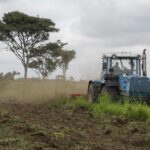The large language models (LLMs) that power most artificial intelligence chatbots and other applications are exponentially more massive than those of earlier systems, relying on vast datasets and billions of parameters to produce their human-like outputs. Such scale is often celebrated as the driver of their cutting-edge capabilities. But scale alone does not guarantee sound […]
IFPRI at the 2024/25 Agriculture Joint Sector Review
The Government of Malawi convened the 2024/25 Agriculture Joint Sector Review (JSR) on 23 January at the Bingu International Convention Centre in Lilongwe, bringing together government ministries, development partners, researchers, private‑sector actors, and farmer representatives. As the country’s central platform for agricultural policy dialogue, the JSR provides an annual opportunity to collectively assess progress, review […]
From Research to Action: Unpacking Anchor Enterprise Models for Agricultural Transformation in Malawi
On 2 December 2025, stakeholders from government, private sector, development partners, and research institutions convened in Lilongwe for a results dissemination event on the potential of anchor enterprise models to accelerate rural and agricultural transformation in Malawi. The event, organized by IFPRI with financial support from the Embassy of Ireland, featured a presentation of research […]
Kasungu Secondary City and Special Economic Zone Development
11 November 2025 Malawi’s ambition to accelerate industrialization and inclusive growth took center stage at a recent workshop focused on Kasungu secondary City’s potential of becoming a strategic hub for agro-processing and regional trade. With the SEZ Act of 2024 paving the way for urban centers to drive investment and innovation, the workshop aimed to […]
Using Organic Wastes to Tackle Deforestation and Improve Fish Quality
21 October 2025 Stakeholders from government, research institutions, NGOs, and donor agencies gathered at Ufulu Gardens in Lilongwe for the dissemination of a groundbreaking study on the use of organic waste to reduce deforestation and improve the quality of smoked fish products. The study, conducted by WorldFish under the EU-funded DeSIRA project, offers promising solutions […]
- 1
- 2
- 3
- …
- 23
- Next Page »





